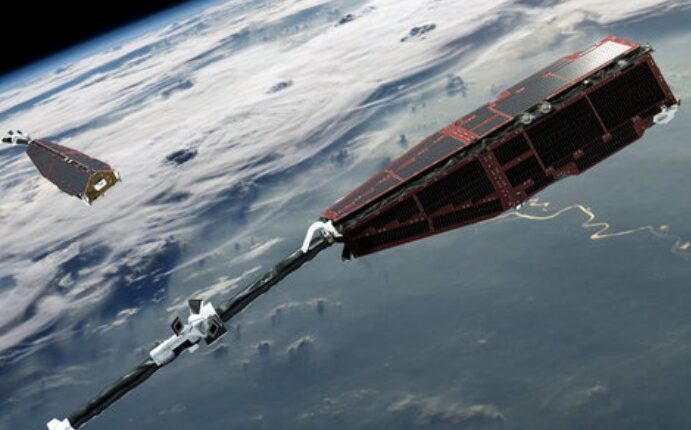©2021 Reporters Post24. All Rights Reserved.
Mission controllers with the European Space Agency were forced to relocate a science satellite upon detecting a threatening piece of space junk, and they did so with very little time to spare—just 8 hours notice, which isn’t a lot of time when it comes to managing objects in space.
ESA’s Swarm satellite constellation launched in 2013, and it’s being used to unlock the mysteries of Earth’s geomagnetic field. The mission uses three satellites, named Alpha, Bravo and Charlie, to measure magnetic signals originating from Earth’s core, and also the planet’s crust, oceans, and parts of the atmosphere.
On June 30, ESA mission control detected a small piece of space debris on a potential trajectory towards Alpha. Based on its calculations, the team predicted that the space junk would collide with Alpha in just eight hours. “The risk of impact was high enough that Alpha needed to get out of the way—fast,” ESA wrote in a statement. The team planned the required evasive action in just four hours.
“ESA’s Space Debris Office analyses data from the US Space Surveillance Network and raises the warning of a potential collision to ESA’s Flight Control and Flight Dynamics teams, usually more than 24 hours before the piece of debris comes closest to the satellite,” according to ESA.
The evasive action made, Alpha was no longer in harm’s way, but mission control had to postpone a maneuver planned for the satellite just a few hours after it nearly collided with the space junk.
The satellite was in the midst of having to execute 25 maneuvers over a span of 10 weeks to reach a higher orbit, placing Alpha in a position away from the Sun as the star goes through a period of increased activity. The Sun goes through an 11-year cycle, during which its solar activity builds up to a maximum before settling back down. Right now, the Sun’s maximum activity is increasing the density of Earth’s upper atmosphere, causing the air to be thicker, and thereby requiring spacecraft to use more fuel to stay in their orbital positions. Both Alpha and Charlie are attempting to escape the effects of atmospheric drag by reaching higher points in their orbits. Thankfully, the mission team was able to reschedule Alpha’s maneuver within 24 hours, otherwise the satellite would’ve drifted towards Charlie, causing their orbits to intersect.
This was a close call for ESA’s Swarm mission, forcing ground control to move the satellite out of the way and into an orbit that doesn’t put it at risk of colliding with another satellite. The team later had to calculate the best way of bringing Alpha back into its orbit while using as little fuel as possible and without losing precious science data. That’s pretty impressive for just eight hours notice, allowing Alpha to continue orbiting its way around Earth unscathed.
Space debris is an increasing concern for space agencies and private companies as more rockets and satellites are sent up into Earth orbit. More than 27,000 pieces of orbital debris are currently being tracked by the Department of Defense’s global Space Surveillance Network, with lots of smaller pieces also floating around undetected.


